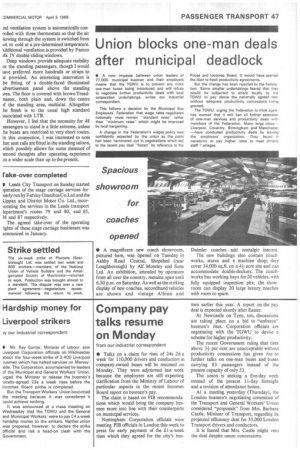Union blocks one-man deals after municipal deadlock
Page 49

If you've noticed an error in this article please click here to report it so we can fix it.
• A new impasse between union leaders of 77,000 municipal busmen and their employers means that the TGWU is to prevent any more one-man buses being introduced and will refuse to negotiate further productivity deals with local corporation undertakings, writes our industrial correspondent.
This follows a decision by the Municipal Bus Employers' Federation that wage rates negotiated nationally must remain "standard rates" rather than "minimum rateswhich might be improved by local bargaining.
A change in the Federation's wages policy was confidently expected by the union as the point had been hammered out in negotiations which led to the recent pay deal "frozenby reference to the
Prices and Incomes Board. It would have opened the door to fresh productivity agreements.
But the change has been rejected by the Federation. Some smaller undertakings feared that they would be subjected to attack locally by the TGWU to pay above the _nationally agreed rate without adequate productivity concessions being granted.
The TGWU, urging the Federation to think again, has warned that it will ban all further extension of one-man services and productivity deals with members of the Federation. Many large cities— Liverpool, Coventry, Birmingham and Manchester —have concluded productivity deals by leaving the employers' organization. They found it necessary to pay higher rates to meet chronic staff ,'.ortages.




























































































































































